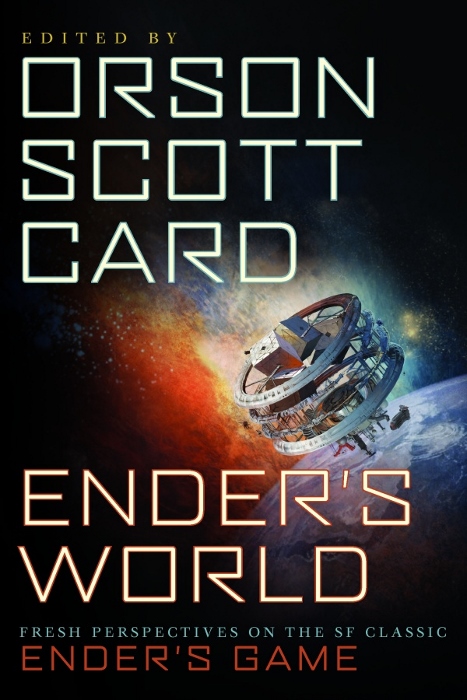“EARTH AFIRE.” Orson Scott Card and Aaron Johnston. 2013 Tor Hardcover 399 pages $25.99
Just in case you were wondering, the answer is yes – I am reviewing these books to coincide with the release of the movie “Ender’s Game.”
The second book in Orson Scott Card and Aaron Johnston’s “Formic Wars” series begins right where “Earth Unaware” left off. Victor Delgado has made it to the lunar colony to warn Earth of the danger – just ahead of the alien spaceship that has been screaming through the solar system leaving a trail of pure destruction and carnage in its wake. Unfortunately, not enough people believe him, and of those who do, most don’t have the power to do anything. The one who has the power is playing power games. And then it’s too late. The formic ship takes up a geosynchronous orbit over China. In fact, government ships escort it in. Politicians’ efforts are met with a deadly response. And the aliens send huge troop ships down to China and begin terra-forming our planet for themselves. Armies and air forces are useless against them.
With all this, Mazer Rackham and the MOPS step into the fray. In fact, this story is equally divided between Mazer and Victor. But can two men figure out some way to stop the formic invasion as they battle bureaucracies and personal egos and vanities?
Card and Johnston keep the story moving at a brisk pace – even when the action isn’t front and center. I eagerly turned every page wanting to see what was coming next.
“Earth Afire” is a war novel first and foremost – in the best of the tradition. But it is far more than action, with a deep heart and soul. There are a few times when the family theme – the strength of family and the human race – is hammered too hard, but the concept is important: Families and humanity can be fractious and contentious, but our strength is found in our unity when a deadly threat is presented. I’ve heard some who have complained about the book’s cliff-hanger ending, but it keeps you on the edge, wanting to know what happens next and eager for the next book. I’m impatient for the next installment, which won’t be available until next summer.
Definitely worth the time and money to invest in a hardcover copy.

“ENDER’S WORLD.” Orson Scott Card, Ed. 2013. POP Books. Trade Paperback. 282 pages. $14.95.
“Ender’s Game” was Orson Scott Card’s first published story, in the magazine “Science Fiction Analog.” (Years ago, when cleaning out my closet and after having read the novel, I discovered that I owned that particular issue of the magazine.) But it wasn’t his first novel. Several years passed between the short story and the novel, during which Card was learning his craft as a science fiction writer. (Previously, he’d written scripts and audio plays.)
Even with all that, there is no way Card could have expected what happened. The book was awarded both the Hugo and Nebula awards for best novel of the year (think winning both the Golden Globes and the Academy Awards). He pulled a nifty trick the next year and won both awards again for the follow-up – “Speaker for the Dead.” To date, he is the only author win both awards in back-to-back years.
But even all that is small potatoes to what “Ender’s Game” became.
It may have taken more than two decades for the book to actually hit the New York Times Bestseller lists, but during those years “Ender’s Game” was having a profound effect on people. In the years since its publication, the book has grown from a cult favorite of sci-fi lovers to a work listed in the top 10 science fiction novels of all time. The book made it onto junior high school, high school and even college summer and in-school reading lists (something Card hates) and has been used as a template for military war games and strategic thinking instruction.
With all this in mind, Card collected a series of essays from a variety of people – most in the sci-fi field but not all – and now we have “Ender’s World,” a look at how Card’s best-known novel has changed the world of science fiction and even the United States military.
The contributors range from Card collaborators (Aaron Johnston, co-author on three books and several graphic novels, and Mette Ivie Harrison, who has been an instructor at Card’s one-day writing workshop at Southern Virginia University) to fellow science fiction writers and even military strategists.
The subjects of “Ender’s World” cover a lot of ground that I had never considered; and yet I as I read each essay, I came to realize what a quiet revolution in the world of science fiction had been wrought by Ender Wiggins. For a young novelist, Card broke many of the literary rules – and it worked. Ender (6 years old at the beginning of the novel and 12 at its end) is a young boy who is forced to save the world; he opened the door for future heroes like Harry Potter.
Johnston discusses Ender in terms of Joseph Campbell’s mythic hero. Father and daughter David Lubar and Alison S. Myers discuss how Ender impacts teen readers. (Both are writers, and Myers is also a teacher.)
For me, the most interesting essays come from those outside the world of science fiction: singer/songwriter Janis Ian, Colonel Tom Ruby (USAF, retired) and former Marine and military strategist John F. Schmitt. Colonel Ruby used “Ender’s Game” in class he taught on leadership at the U.S. Air Force Air Command and Staff College – a graduate school for Air Force officers. Schmitt used Ender’s tactics in developing a different, more flexible and effective approach to battle known as Maneuver Warfare.
Neil Shusterman provides a very thoughtful, touching and even humorous addition. Perhaps the best entry of all comes from Ken Scholes – a brilliant rising star in the world of fantasy and a latecomer to “Ender’s Game.” Although he’d read several of Card’s other works, he had yet to read the seminal one. He didn’t actually read “Ender’s Game” until he received a request to write for this compilation. His essay is moving in the very best sense of the word.
You may think you know all about “Ender’s Game,” but until you’ve read “Ender’s World” you really don’t understand the true power of what Orson Scott Card did.
Rich welcomes questions and comments from readers. You may contact him through The Independent or by e-mail at [email protected]




